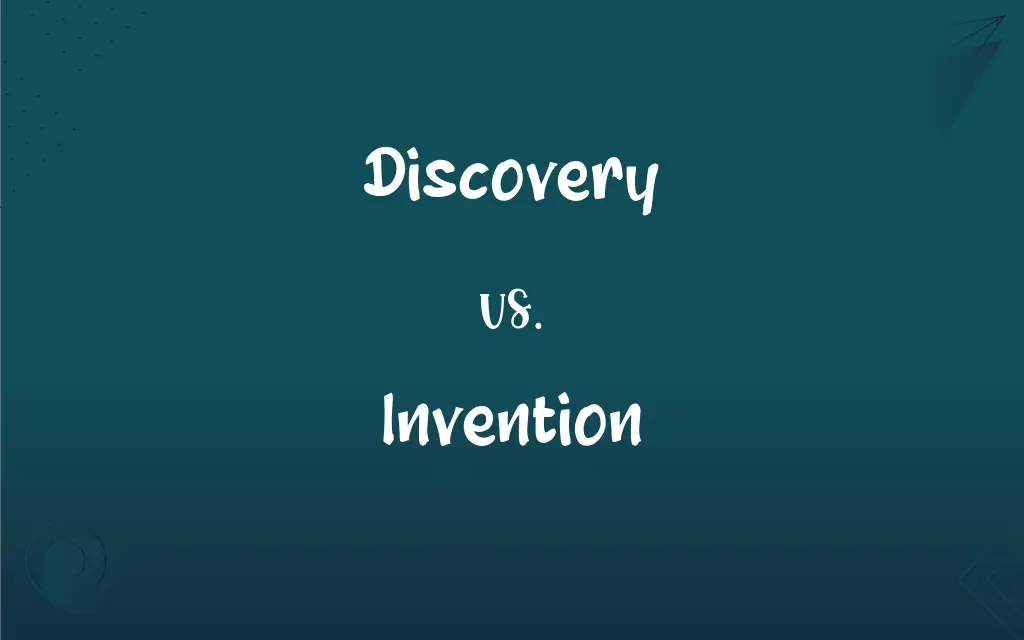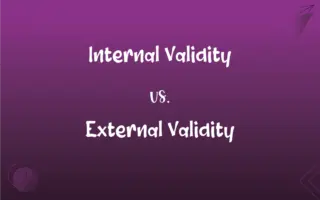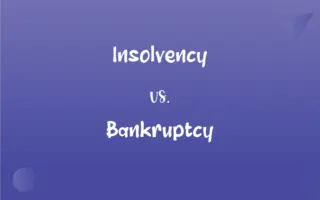Discovery vs. Invention: What's the Difference?
Edited by Aimie Carlson || By Harlon Moss || Published on November 28, 2023
Discovery is finding something that already exists, while invention involves creating something new.

Key Differences
Discovery refers to the process of uncovering or revealing something that already exists in nature. In contrast, invention is the act of creating or designing something entirely new that did not previously exist.
A discovery does not involve the creation of new materials or concepts but rather the observation and understanding of existing ones. On the other hand, an invention is a product of human ingenuity and creativity, bringing new ideas or objects into existence.
Discoveries often enhance our understanding of the natural world, like uncovering a new species or understanding a natural phenomenon. Inventions, however, contribute to technological and societal advancements by introducing new tools, devices, or methods.
Discoveries can happen accidentally or through systematic research, revealing hidden aspects of the world. Inventions require a deliberate process of development and design, often involving problem-solving and experimentation.
The impact of a discovery is often in the expansion of knowledge and understanding, such as discovering a scientific principle. In contrast, the impact of an invention is typically seen in its practical application and the creation of new opportunities, like a new technology or product.
ADVERTISEMENT
Comparison Chart
Nature
Finding what already exists.
Creating something new.
Process
Observational and exploratory.
Creative and constructive.
Outcome
Enhanced understanding of the natural world.
New tools, devices, or methods.
Involvement
Can be accidental or through research.
Requires deliberate effort and innovation.
Impact
Expands knowledge or understanding.
Generates practical applications and technology.
ADVERTISEMENT
Discovery and Invention Definitions
Discovery
Discovery involves revealing hidden or new knowledge.
The discovery of gravitational waves confirmed Einstein's theory.
Invention
Invention is the creation of a new device or process.
The invention of the telephone revolutionized communication.
Discovery
Discovery is the act of finding something unknown.
The discovery of penicillin was a major medical breakthrough.
Invention
Invention is a product of human creativity and innovation.
The invention of the internet transformed global connectivity.
Discovery
Discovery is an act of detecting or learning something new.
The discovery of a new planet excited astronomers.
Invention
Invention refers to the development of new technologies.
The invention of the airplane opened new travel possibilities.
Discovery
Discovery is the uncovering of facts or truths.
The discovery of the DNA double helix transformed biology.
Invention
Invention involves designing and creating something original.
The invention of the light bulb brought light to homes.
Discovery
Discovery is finding something that already exists.
The discovery of the Americas by Europeans changed history.
Invention
Invention is the act of bringing a new idea into existence.
The invention of renewable energy sources is vital for sustainability.
Discovery
The act or an instance of discovering.
Invention
The act or process of inventing
Used a technique of her own invention.
Discovery
Something discovered.
Invention
A new device, method, or process developed from study and experimentation
The phonograph, an invention attributed to Thomas Edison.
Discovery
(Law) The compulsory disclosure to the opposing party of factual information or documents relevant to a lawsuit prior to trial.
Invention
A mental fabrication, especially a falsehood.
FAQs
What defines an invention?
An invention is the creation of something completely new.
Do discoveries always require scientific research?
Discoveries can result from research or occur accidentally.
Can a discovery lead to an invention?
Yes, discoveries can inspire new inventions.
Are inventions always patentable?
Inventions are patentable if they are new, useful, and non-obvious.
What is an example of a significant invention?
The invention of the computer significantly impacted modern society.
Can discoveries be planned?
Discoveries can be serendipitous or the result of planned research.
What defines a discovery?
A discovery is finding or revealing something that already exists.
Are inventions based on existing knowledge?
Inventions often build upon or utilize existing knowledge.
What is an example of a significant discovery?
The discovery of electricity was significant for technological advancement.
How do inventions impact society?
Inventions can have wide-ranging impacts on society and lifestyle.
Is an invention always a physical object?
No, inventions can be processes or methods, not just physical objects.
Can a discovery change scientific understanding?
Yes, discoveries can significantly alter our understanding of science.
Are discoveries always welcomed?
Discoveries can be controversial or challenge existing beliefs.
Can a discovery be patented?
Only inventions are patentable, not discoveries.
Is creativity essential for inventions?
Creativity is a key component in the invention process.
Can anyone create an invention?
Yes, anyone with creativity and problem-solving skills can invent.
How do inventions benefit the economy?
Inventions drive technological progress, business growth, and economic development.
Do discoveries have practical applications?
Discoveries can lead to practical applications, often through inventions.
Are all discoveries scientific?
Discoveries can be scientific, historical, or in other knowledge domains.
What motivates inventors?
Inventors are often motivated by curiosity, problem-solving, and the desire to improve lives.
About Author
Written by
Harlon MossHarlon is a seasoned quality moderator and accomplished content writer for Difference Wiki. An alumnus of the prestigious University of California, he earned his degree in Computer Science. Leveraging his academic background, Harlon brings a meticulous and informed perspective to his work, ensuring content accuracy and excellence.
Edited by
Aimie CarlsonAimie Carlson, holding a master's degree in English literature, is a fervent English language enthusiast. She lends her writing talents to Difference Wiki, a prominent website that specializes in comparisons, offering readers insightful analyses that both captivate and inform.






































































